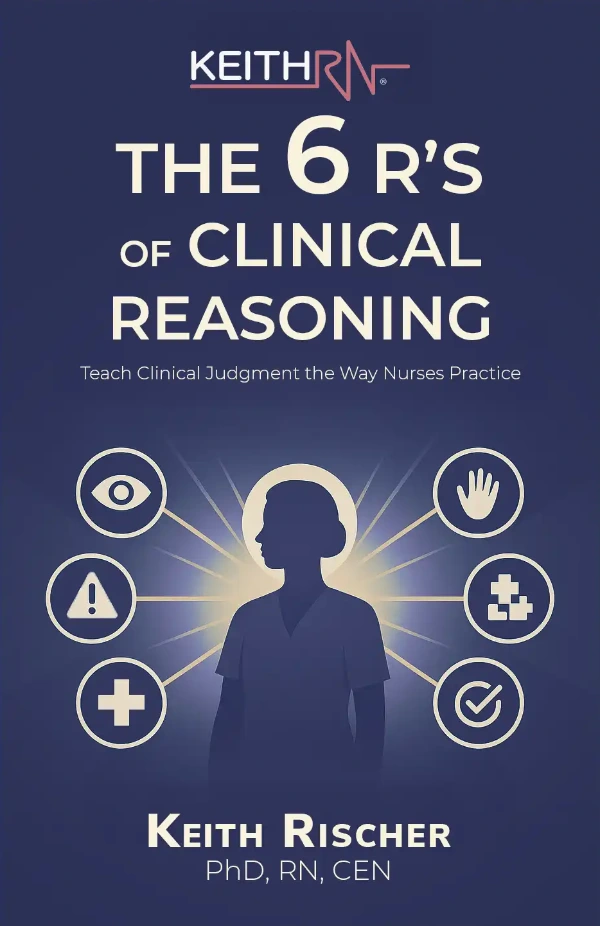
I addressed a recent post by a member in the Facebook group Teachers Transforming Nursing Education in a recent discussion on Facebook and YouTube live. “What do you guys do for post conference at clinical? I’m out of ideas and I feel like my students are so drained and bored by the end of the day.”
You know this is a situation that we all experience as nurse educators. As students are getting back into a clinical setting or even in just virtual clinical we want to call it a day and go home. But I want to encourage you to not do that because one of the most powerful aspects of clinical to develop clinical judgment is reflection on your thinking.
When we look at developing clinical judgment, Tanner’s model of clinical judgment emphasizes four steps—noticing, interpreting, responding and reflecting on your thinking. What we need to recognize is that Tanner’s model aligns with the six steps of the NCSBN model.
As educators, we’re really stressed about Next Gen, but we don’t need to teach the NCSBN model — let’s teach nursing process and Tanner’s Clinical Judgment Framework. As educators we must be familiar with Tanner’s model which provides the essence of the reasoning that a nurse uses to make the outcome of a correct clinical judgment.
Tanner’s four steps align with the nursing process and the noticing and interpreting are the first two steps. What do you notice from that assessment? What’s your interpretation or the meaning? And then what’s your response going to be with the plan of care?
But then the fourth step of Tanner’s framework to develop clinical judgment is reflecting on your thinking. So when you look at reflection, we need to really have our students look at every decision that they made in clinical and reflect in post-conference:
- What did they do well?
- What decisions were made?
- Let’s talk about decisions that we made — Were they good decisions? Were they the right decisions?
- How can you apply what was learned to future patients you care for?
The more that we reflect on every decision that a nurse makes, we’re developing clinical judgment. That’s why we must not short change reflection, because we short change clinical judgment.
Some educators in the Facebook group also provided their strategies that we can use in post-conference to develop clinical judgment:
- Go to the state board of nursing website for public records of dispositions of nurses reported to the board. They explain the situation with detail and what happened to the nurse at the end. Students need to recognize the high standards of practice and we can learn from the mistakes of others.
- Practice giving SBAR in post-conference. Students can do this together. Assign them a medication at the beginning of the day, and they have to teach the educator like they are the patient’s family. By reflecting on SBAR we can strengthen not only SBAR, but clinical judgment and recognizing and highlighting what was most important.
- Choose four students and have them report on a patient as if they are leaving for the day. Ask them, “Who is the priority patient? Which one of these patients should be seen first by the nurse?” Get them looking at the essential data to make decisions.
- Use case studies. Practice some of the reasoning that your students may not get or some of the patients that are relevant in your clinical setting. One of the goals as educators is to bring context to our content. KeithRN case studies are unique because they replicate clinical realities — they unfold as a nurse experiences real world care with vital signs assessment and integrate Tanner’s clinical judgment model.
Closing Thoughts
The Guide for Reflective Journaling that Mohave Community College developed is a powerful one-page worksheet that takes Tanner’s model and makes it practical by providing questions after clinical. In this handout there are some simple questions such as:
- What would you do differently if you encountered this situation or had to make this decision again?
- What additional information and skills do you need when encountering this situation in the future?
- Describe any changes in your values or feelings as a result of your clinical day.
When we talk about professional identity formation, our values and our feelings — “What did you feel in clinical today?” That’s something we need to talk about in post-conference.
To learn more, watch the video of this discussion:
Keith Rischer – PhD, RN, CEN
As a nurse with over 35 years of experience who remained in practice as an educator, I’ve witnessed the gap between how nursing is taught and how it is practiced, and I decided to do something about it! Read more…
The Ultimate Solution to Develop Clinical Judgment Skills
KeithRN’s Think Like a Nurse Membership
Access exclusive active learning resources for faculty and students, including KeithRN Case Studies, making it your go-to resource.




